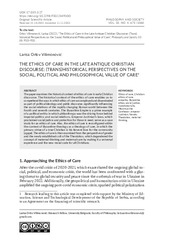Приказ основних података о документу
The Ethics of Care in the Late Antique Christian Discourse: (Trans) historical Perspectives on the Social, Political and Philosophical Value of Care
Etika brige u kasno-antičkom hrišćanskom diskursu: (trans)istorijske perspektive o društvenoj, političkoj i filozofskoj vrednosti brige
| dc.creator | Orlov Vilimonović, Larisa | |
| dc.date.accessioned | 2023-01-11T14:18:19Z | |
| dc.date.available | 2023-01-11T14:18:19Z | |
| dc.date.issued | 2022 | |
| dc.identifier.issn | 0353-5738 | |
| dc.identifier.uri | https://journal.instifdt.bg.ac.rs/index.php/fid/article/view/1515 | |
| dc.identifier.uri | http://rifdt.instifdt.bg.ac.rs/123456789/2745 | |
| dc.description.abstract | The paper examines the historical context of ethics of care in early Christian discourse. The historical context of the ethics of care enables us to comprehend the ways in which ethics of care was employed and disseminated as part of political ideology and public discourse, significantly influencing the social relations of the rapidly changing Roman world between the fourth and seventh centuries. The Byzantine Empire is a prime example of a political entity in which philanthropy was the driving force behind imperial politics and social relations. Emperor Justinian’s laws, which proclaimed social justice and protection for those in need, serve as a case study for an ethics of care. Also, the ethics of care is reconfigured within the context of Byzantine theology as a theology of care, in which the primary virtue of a true Christian is his fervent love for the community (agape). The ethics of care is then examined from the perspective of gender and the newly established cult of the Theotokos, which degendered the concept of maternal thinking and maternal care by making it a universal experience and the new moral code for all Christians. | sr |
| dc.description.abstract | U radu se ispituje istorijski kontekst etike nege u ranohrišćanskom diskursu. Istorijski kon tekst etike brige nam omogućava da sagledamo načine na koje je etika brige bila korišćena i rasprostranjena kao deo političke ideologije i javnog diskursa čime je značajno uticala na društvene odnose u rimskom svetu koji se brzo menjao između četvrtog i sedmog veka. Vi zantijsko carstvo je vrhunski primer političkog entiteta u kojem je filantropija bila pokretačka snaga imperijalne politike i društvenih odnosa. Zakoni cara Justinijana, koji su proklamovali društvenu pravdu i zaštitu onih kojima je potrebna, služe kao studija slučaja za etiku brige. Takođe, etika brige je rekonfigurisana u kontekstu vizantijske teologije kao teologije brige u kojoj je primarna vrlina pravog hrišćanina njegova žarka ljubav prema zajednici (agape). Etika brige se zatim ispituje iz perspektive pola i novouspostavljenog kulta Bogorodice koji je lišio koncept majčinskog razmišljanja i majčinske brige rodnih dimenzija tako što ga je učinio uni verzalnim iskustvom i novim moralnim kodeksom za sve hrišćane. | sr |
| dc.language.iso | en | sr |
| dc.publisher | Beograd : Institut za filozofiju i društvenu teoriju | sr |
| dc.rights | openAccess | sr |
| dc.rights.uri | https://creativecommons.org/licenses/by-nc-nd/4.0/ | |
| dc.source | Filozofija i društvo/Philosophy and Society | sr |
| dc.subject | Ethics of care | sr |
| dc.subject | Christian ethics of care | sr |
| dc.subject | empathy | sr |
| dc.subject | Byzantine ethos | sr |
| dc.subject | social justice | sr |
| dc.subject | transhistoricity | sr |
| dc.subject | Maximus the Confessor | sr |
| dc.subject | emperor Justinian | sr |
| dc.subject | Novels | sr |
| dc.title | The Ethics of Care in the Late Antique Christian Discourse: (Trans) historical Perspectives on the Social, Political and Philosophical Value of Care | sr |
| dc.title | Etika brige u kasno-antičkom hrišćanskom diskursu: (trans)istorijske perspektive o društvenoj, političkoj i filozofskoj vrednosti brige | sr |
| dc.type | article | sr |
| dc.rights.license | BY-NC-ND | sr |
| dc.citation.issue | 4 | |
| dc.citation.volume | 33 | |
| dc.citation.spage | 910 | |
| dc.citation.epage | 933 | |
| dc.identifier.doi | 10.2298/FID2204910O | |
| dc.type.version | publishedVersion | sr |
| dc.identifier.fulltext | http://rifdt.instifdt.bg.ac.rs/bitstream/id/9516/bitstream_9516.pdf |

